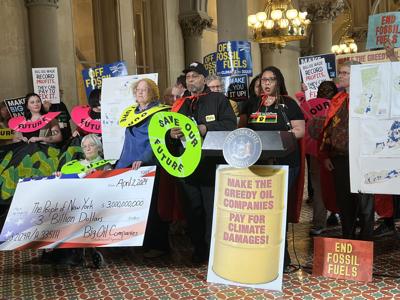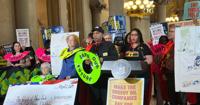Capital Region environmental advocates, good government groups and faith groups held a press conference with state lawmakers at the state Capitol on Tuesday to push for the passage of a bill that would require oil and gas companies to pay $3 billion annually for 25 years to help offset the costs of climate change.
The Climate Change Superfund Act is modeled after the federal Superfund program that allows the U.S. Environmental Protection Agency to clean up contaminated sites and also requires the parties responsible for the contamination to clean them or reimburse the government for the cleanup work. Speaking at the press conference, state Sen. Rachel May said energy companies will never pay for the costs voluntarily.
“This is the concept of the polluter pays. It works at the federal level, it will work here in New York,” said May, who represents parts of Cayuga and Onondaga counties, including the city of Syracuse. “Funds from the fossil fuel companies will go into a cost-recovery program to address the needs of disadvantaged communities that are facing flooding, facing dangerous heat waves, facing high winds, all kinds of things that are stressing the infrastructure and damaging health and wellbeing of people there. So, there are something like 1,700 of these communities statewide, and as many as 50 in my district, so they all desperately need new infrastructure. And I am proud that we are working to make this a reality. This is common sense economics. Every small retailer knows the phrase. ‘You break it, you buy it!’”
The press conference follows the release of a report last year by state Comptroller Tom DiNapoli that indicated that more than half of New York localities’ municipal spending is or will be linked to climate change. For example, New York City may need to spend about $100 million to upgrade its sewer system to withstand intensified storms.
New York Public Interest Research Group Executive Director Blair Horner stressed the bill is written in a way that would not allow the oil companies to pass along the costs to the consumers, adding it is not a carbon tax.
“The bill also says roughly 35% of the revenues are used or to be used for disadvantaged communities,” Horner said. “The oil companies have the money. They made $870 billion — with a B — in profits over the last few years. They have the money. They’ve known ... for 50 years about the damage they were causing and it’s about time they pay up.”
Following the press conference, advocates delivered an oversized novelty $3 billion check to the governor’s office, paid to the people of New York by big oil companies.









